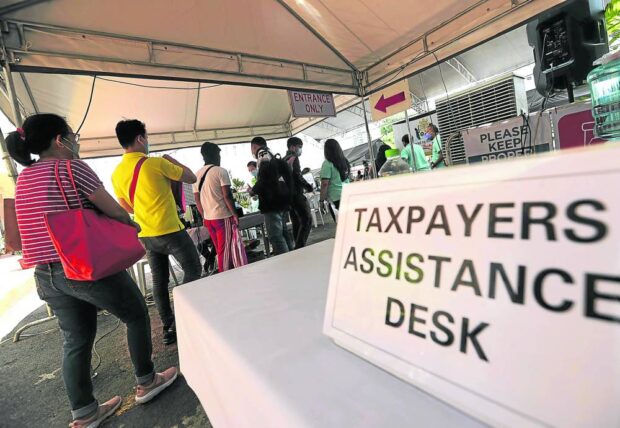MANILA, Philippines — President Ferdinand Marcos Jr. signed into law last Friday Republic Act No. 11976, or the Ease of Paying Taxes Act, which aims to shore up government revenues needed to fund social and infrastructure projects by making it easier for Filipinos to pay their taxes.
The Presidential Communications Office said in a statement on Sunday: “The law will modernize and increase the efficiency and effectiveness of tax administration and strengthen taxpayer rights, and allow the government to capture as many taxpayers as possible into the tax net by streamlining the system and minimizing the burden on taxpayers, increasing the country’s revenue collection in the long run.”
Under the new law, taxpayers will be allowed to electronically or manually file tax returns with the Bureau of Internal Revenue (BIR), any authorized agent bank or authorized tax software provider.
The law also allows nonresidents to register for these facilities, in a bid to attract foreign investors and make it easier for them to do business in the Philippines.
The BIR, the country’s main revenue collecting agency, is now also mandated to act on claims to refund taxes erroneously or illegally collected within 180 days.
The threshold for mandatory issuance of receipts was raised to P500 from P100.
The number of income tax return pages for micro and small taxpayers was also cut to two from four previously.
Priority measure
Other salient features of the law include the classification of taxpayers into micro, small, medium and large; the option to pay internal revenue taxes to the city or municipal treasurer; elimination of the distinction between documentation and basis of sales of goods and services; classification of value-added tax refund claims into low, medium and high-risk; and reduction of documentary requirements in various taxation procedures.
RA 11976 was mentioned as a priority legislation during Mr. Marcos’ State of the Nation Address in 2022 and 2023 and supports the administration’s 8-Point Socioeconomic Agenda through the collection of more taxes to enhance economic and social development.
The Marcos government wants to raise its tax effort, which is the share of tax collections to gross domestic product (GDP), to above 17 percent by 2028 from more than 14 percent currently, and sustain infrastructure spending at 5 to 6 percent of GDP.
In all, RA 11976 amends 39 sections and repeals one provision of the National Internal Revenue Code of 1997 in a bid to update the Philippine taxation system.
To speed up its processes, the BIR was directed to craft a digitalization road map to ease tax compliance, especially for micro and small taxpayers who have long been burdened by complex and cumbersome tax payment procedures.
Electronic system
Other digitalization initiatives that should be carried out by the agency include the adoption of an integrated and automated system for facilitating basic tax services and the setting up of electronic and online system for data and information exchange between offices and departments.
Aside from the filing of returns by persons and corporations, electronic system should provide other tax services such as payment of taxes, fines, surcharges and penalties; registration as a taxpayer; issuance and validation of the Taxpayer Identification Number; and submission of supporting documents and reports.
The implementing rules and regulations will be promulgated 90 days from the effectivity of the law after consultations between the secretary of the Department of Finance, the BIR and the private sector.
RA 11976 takes effect 15 days after its publication in the Official Gazette or in a newspaper of general circulation. A copy of the law was uploaded on the Official Gazette website on Sunday.
